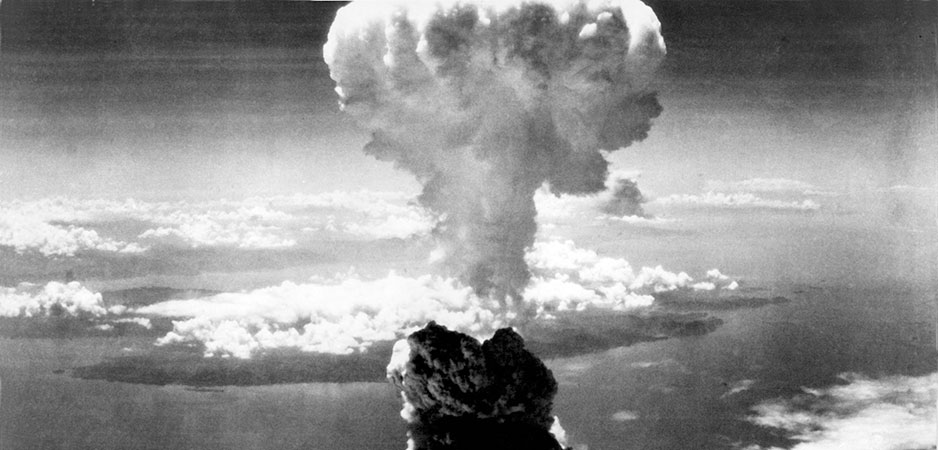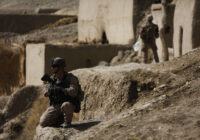As Americans once again struggle with the very idea of having a history, let alone reflecting on its significance, an article in The Nation originally published in 2015 marks the anniversary of the bombing of Hiroshima and Nagasaki. It offers its readers a reminder of an event that no one has forgotten but whose monumental significance has been consistently distorted, if not denied.
Japan’s surrender in 1945 officially ended World War II. It marked a glorious moment in history for the United States. But most serious historians agree on one fact that everyone has insisted on forgetting. The war would have ended without the demonstration of American scientific and military prowess carried out at the expense of hundreds of thousands of Japanese lives.
Interactive: The Story of World War II
If history has any meaning, humanity should have applied to August 6, 1945, the very words President Franklin D. Roosevelt used at the beginning of America’s war with Japan following the attack on Pearl Harbor on December 7, 1941. More than Pearl Harbor, August 6, 1945, should be remembered as “a date which will live in infamy.”
In the article originally published to mark the 70th anniversary of the events that led to the end of World War II, the author, Gar Alperovitz, reminds us that almost every US military leader at the time counseled against dropping the bomb. It cites the testimony of Admiral William Leahy, President Harry Truman’s chief of staff; Henry “Hap” Arnold, the commanding general of the US Army Air Forces; Fleet Admiral Chester Nimitz, commander-in-chief of the Pacific Fleet; and Admiral William “Bull” Halsey Jr., commander of the US Third Fleet.
All these senior officers agreed that “the first atomic bomb was an unnecessary experiment.” Even Major General Curtis LeMay, who nearly 30 years later tried to push John F. Kennedy into a nuclear war with the Soviet Union during the Cuban missile crisis in 1962, agreed that “the atomic bomb had nothing to do with the end of the war at all.”
General Dwight Eisenhower, the future president, also believed “that Japan was already defeated and that dropping the bomb was completely unnecessary.” But Eisenhower added this consideration of profound geopolitical importance, which directly contradicts the official pretext given by the government and repeated in the official narrative, that thousands of American soldiers would die in the final assault on Japan. “I thought that our country should avoid shocking world opinion by the use of a weapon whose employment was, I thought, no longer mandatory as a measure to save American lives,” he said.
Here is today’s 3D definition:
World opinion:
The understanding people across the globe have of how a hegemonic power works for or against their interests, a phenomenon that hegemonic powers learn to ignore as soon as they become convinced of the stability and durability of their hegemony
Contextual Note
World War II marked a sea-change in geopolitics. It literally ushered in the era of technological rather than purely military and economic hegemony. The real point of the bomb was to provide a graphic demonstration of how technological superiority rather than mere economic and military clout would define hegemony in the decades to come. That’s why the US has been able to consistently lose wars but dominate the global economy.
“President Truman’s closest advisers viewed the bomb as a diplomatic and not simply a military weapon,” Alperovitz writes. It wasn’t just about ending the war but modeling the future. Truman’s secretary of state, James Byrnes, “believed that the use of atomic weapons would help the United States more strongly dominate the postwar era.” He seemed to have in mind the “military-industrial complex” that Eisenhower would later denounce.
Eisenhower’s prediction about world opinion in the aftermath of the nuking of Japan was apparently wrong. Polls taken in 1945 showed that only 4% of Americans said they would not have used the bomb. Relieved to see the war over, the media and governments across the globe made no attempt to mobilize world opinion against a manifest war crime.
On the basis of the letters to the editor of The Times, one researcher nevertheless reached the conclusion that, in the UK, a majority of “civilians were outraged at the atomic bombings of Hiroshima and Nagasaki.” This probably reflects opinion across most of Europe. The Vatican roundly condemned the use of nuclear weapons, even two years before the bombing of Japan and then again after the war, but it had little impact on public opinion.
Focused on the drama of the Nuremberg trials rather than the mass destruction in Japan, the nations of the world very quickly adjusted to the fatality of living with the continued presence of nuclear bombs. They even accepted the bomb as a stabilizing norm in what quickly became the Cold War’s nuclear arms race. After all, the idea of mutuality in the strategy of mutually assured destruction seemed to keep things in some sort of precarious balance.
With history effectively rewritten in a manner agreeable to the hegemony-minded governments of the US, American soft diplomacy — spearheaded to a large extent by Hollywood — did the rest. The American way of life almost immediately became a global ideal, only peripherally troubled by Godzilla and other disturbing radioactive mutants.
Takeshi Matsuda explained in a 2008 article in the Asia-Pacific Journal: “By the end of World War II, the U.S. government had recognized how important a cultural dimension of foreign policy was to accomplishing its broad national objectives.” Those “national objectives” had clearly become nothing less than global hegemony.
Historical Note
Post-World War II history contains a cruel irony. An inhuman nuclear attack on Japanese civilians became perceived as the starting point of a new world order under the leadership of the nation that perpetrated that attack. The new world order has ever since been described as the “rule of law.”
Because the new order relied on the continued development of nuclear weapons, it might be more accurate to call it a “rule of managed terror.” It was built on the notion of fear. Over the following decades, the vaunted rule became increasingly dependent on a combination of expanding military might, mass surveillance, technological sophistication and the capacity of operational weapons to strike anywhere with great precision but without human intervention.
In his article, Gar Alperovitz quotes a pertinent remark in 1946 of Admiral William “Bull” Halsey Jr., who called “the first atomic bomb … an unnecessary experiment. … It was a mistake to ever drop it … [the scientists] had this toy and they wanted to try it out, so they dropped it.” But Halsey was mistaken. The scientists didn’t drop the bombs. The politicians — especially Harry Truman, with whom the buck was destined to stop — ordered it. And bomber pilots did the dropping. But Halsey’s intuition about the rise of technology as the key to hegemony was correct.
Whether Truman understood what was happening, or whether he was an unwitting tool of a group of American Dr. Strangeloves (the former Nazis were already being recruited), no historian has been able to determine. Fox News journalist Chris Wallace, in his book on Truman and the bomb, claims that the president “agonized over it,” as well he should have.
The problem that remains for those who seek to understand the significance of our global history is that once the deed was done, Truman’s and everyone else’s agonizing ended. Shakespeare’s Macbeth famously “murdered sleep,” but America’s official historians, in the years following Hiroshima, succeeded in putting the world’s moral sense to sleep.
Humanity is still on the verge of nuclear annihilation. Some of the bellicose discourse we hear today may be bluff. But the US military has elaborated concrete plans for a nuclear war with China, and preparations for that war are already taking place. As journalist John Pilger points out, US Secretary of State Mike Pompeo has been pushing hard to foment a war mentality among the American public, partly because it is part of Trump’s reelection strategy and partly because Pompeo is “an evangelical fanatic who believes in the ‘rapture of the End.’”
World opinion, if our democracies knew how to consult it, would undoubtedly prefer the plain and simple annihilation of our nuclear capacity. But the dream of a democracy of humanity, in the place of competing nation-states, dwells only in an obscure political and psychological limbo, existing as something between an empty promise and wishful thinking.
*[In the age of Oscar Wilde and Mark Twain, another American wit, the journalist Ambrose Bierce, produced a series of satirical definitions of commonly used terms, throwing light on their hidden meanings in real discourse. Bierce eventually collected and published them as a book, The Devil’s Dictionary, in 1911. We have shamelessly appropriated his title in the interest of continuing his wholesome pedagogical effort to enlighten generations of readers of the news. Click here to read more of The Daily Devil’s Dictionary on Fair Observer.]
The views expressed in this article are the author’s own and do not necessarily reflect Fair Observer’s editorial policy.
Support Fair Observer
We rely on your support for our independence, diversity and quality.
For more than 10 years, Fair Observer has been free, fair and independent. No billionaire owns us, no advertisers control us. We are a reader-supported nonprofit. Unlike many other publications, we keep our content free for readers regardless of where they live or whether they can afford to pay. We have no paywalls and no ads.
In the post-truth era of fake news, echo chambers and filter bubbles, we publish a plurality of perspectives from around the world. Anyone can publish with us, but everyone goes through a rigorous editorial process. So, you get fact-checked, well-reasoned content instead of noise.
We publish 2,500+ voices from 90+ countries. We also conduct education and training programs
on subjects ranging from digital media and journalism to writing and critical thinking. This
doesn’t come cheap. Servers, editors, trainers and web developers cost
money.
Please consider supporting us on a regular basis as a recurring donor or a
sustaining member.
Will you support FO’s journalism?
We rely on your support for our independence, diversity and quality.






